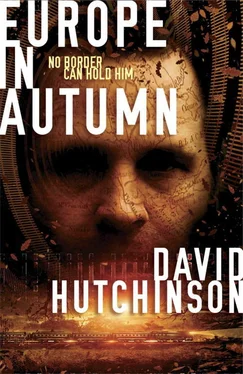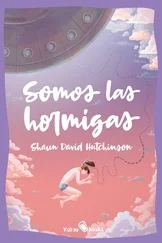Students of cartography will note the painstaking detail lavished not only on the spurious area of ‘Ernshire,’ but on all other areas of the map. Comparison with contemporary Ordnance Survey sheets shows a certain elegance of execution absent in the OS material. Sheet 2000, for all its faults, remains gorgeously custom-made, with all the care and attention – indeed, if the word can be used to describe a map, all the poetry – that entails. It is something which we today, with our satellite-assisted, computer-drawn maps, have lost, and recalls a time when maps did exercise a power over the landscape – if only in the imagination.
8One anecdote remains, and though its source is uncertain and there is no way to confirm it, it is in keeping with the story of Sheet 2000, and perhaps deserves to be set down here.
In the year 1926, at the age of 94, Mrs Margaret Allen was visited by a young man who claimed to be her nephew.
Sister Ruth, who ran the nursing home where Mrs Allen spent her final years, is reported to have told a friend that the old lady was extremely excited by the encounter. Sister Ruth recalled that the young man, who called himself Stephen, spoke with an indefinable rural accent, and left Mrs Allen a certain document.
Mrs Allen jealously guarded the document given to her by Stephen, and after her death it was nowhere to be found, but Sister Ruth claimed to have seen it once, and described it as ‘a map.’
Sister Ruth, as far as is known, never described the map to her ‘friend,’ but she did mention one feature. It was marked, she said, in the bottom right-hand corner: Whitton-Whyte and Sons. Mapmakers. Stanhurst .
“SOME KIND OF novel,” Lev hazarded. “A utopian fiction.”
Rudi sat with his hands clasped to the sides of his head, like a man with a horrible hangover. “This is insane,” he murmured, looking down at the decrypts of the loose typewritten sheets arranged on the coffee table in front of him.
According to Lev, the code was quite arcane, a variation of something which had been developed for commercial use in England in the late eighteenth century. The cloth laptop had taken three days to crack it, but now it was happily delivering pages of cleartext at a rate of two or three a day. They were already several pages into the handwritten parts of the notebook. Columns of digits and letters were scanned into the laptop, and out came descriptions of towns, villages, hamlets, ratings of pubs and restaurants and guest houses.
“Are you sure that thing is working properly?” Rudi asked, nodding at the laptop.
“If it wasn’t, you wouldn’t be able to read anything at all.”
Rudi picked up one of the pages of lists and looked helplessly at it. “This is…” He shook his head. “ A Gazetteer of the Towns and Villages of Ernshire ,” he read.
Lev shrugged. “A fiction.”
Rudi dropped the sheet of paper on the coffee table and stood up and limped over to the window.
“Do you want me to stay?” Lev asked.
Rudi looked round. “I’m sorry?”
“The laptop works itself. All you have to do is type in the groups. You don’t need me any more.”
Rudi shook his head. “Could this Gazetteer be a code itself?”
“Of course. Take such and such letters from each line and you get a message. The Komsomol flies at night .”
“Can the laptop scan for that kind of thing?”
“Yes, but it would be quicker if you had the key.”
“Which would be…?”
Lev picked up the old railway timetable and riffled its pages speculatively.
“I looked,” Rudi said. “There are no marks. Nothing to suggest any of those entries is any more significant than the others. And before you ask, I did the thing of letting it fall open on its own, too. Nothing. Nothing obvious, anyway.”
“Perhaps the key will turn up further on in the text itself,” Lev theorised. “Although that would be quite unsecure.” He added, “I don’t want you to think I’m milking this job.”
Rudi broke into a broad smile. “Why on Earth would I think that?”
Lev gestured at the decrypts.
Rudi shook his head. “Whatever is going on here, it’s not your fault, Lev. Stay around; let’s see if we can make any sense of this, okay?”
Lev nodded. “Okay.”
ALTHOUGH MAKING SENSE of it was easier said than done. The Gazetteer ended, and the notebook began to yield up a history and description of a country which did not exist.
Taking as its jumping-off point the typewritten fiction which Lev had first translated, the notebook’s unknown writer went on to speak of a nation he called The Community . The Community was the Whitton-Whytes’ greatest dream, a country mapped over the top of the whole of Europe and entirely populated by Englishmen. It sounded like the setting for an enormous Agatha Christie mystery, all county towns and vicarages and manor houses. Rudi thought it was a blessing that Fabio hadn’t lived to see just how worthless his great prize had been.
On the other hand…
Lev’s laptop delivered three pages of decrypts a day. After the twelfth day, Rudi began to feel a vague unease, and for no reason he could have articulated and against Lev’s loud protests, he booked them out of the hotel and moved them to another island.
A week later, he located the source of his unease.
One night, going through the contents of the burnbox, he took out the map of the Line again, rolled it out onto the floor of their room, weighted the corners down with ashtrays and beer bottles, and got down on hands and knees to examine it properly.
He had, he realised, been going about this the wrong way. Fabio had risked his life – had risked both their lives – to steal what appeared to be a perfectly standard map, one you could buy at most post offices in most countries. Fabio was eccentric and irresponsible, but he was not stupid. Therefore, it must not be a perfectly standard map. This much should have been obvious to him immediately, and probably would have been if the decrypts hadn’t captured so much of his attention.
“I’m ashamed of myself,” he told Lev. “The map should have been the first thing I looked at. And me a Coureur.”
Lev, who was sitting on the sofa reading the day’s product and drinking vodka, only grunted.
Here was the Line, and if you had any reservations about its name, here was the proof. It really was just a line, a stitch that ran across Europe, a country thousands of kilometres long but only ten kilometres across at its broadest point. Here were the towns it ran through, the marshalling yards and embassies and consulates, branch lines, maintenance depots… branch lines…
Rudi leaned down until his nose was a few centimetres from the surface of the map. The Line needed branches for shunting, and for repair crews, and to connect it to some embassies and consulates, as in Poznań, and to bring supplies in from the countries it passed through. In a lot of ways, it was less independent than it liked to pretend. Running his finger along the twin tracks of the main Line, Rudi could see dozens of branches curling off, to a depot here, a town there.
And some of them seemed to curl off into nowhere.
At the end of one branch, just before the border between Greater Germany and Poland, was a word he recognised: Stanhurst .
Rudi got up and picked up the previous day’s decrypts. And there it was. Stanhurst, a beguiling county town, contains one of the greatest cathedrals in the Community.
He grabbed the railway timetable and began to page through it, and within a minute there it was. Train times from Paddington to Stanhurst.
Lev looked up from his reading. “What?”
Читать дальше







